AMERICAN CHORAL DIRECTORS ASSOCIATION
WESTERN REGION NEWSLETTER

WINTER 2025



AMERICAN CHORAL DIRECTORS ASSOCIATION
WESTERN REGION NEWSLETTER

WINTER 2025


ExecutiveCommittee
JulieDana,President
AimeeStewart,President-elect
MichaelShort,Past-president
DavidSonnichsen,Treasurer
NickyManlove,DEIInitiativesChair
NaomiGamezPenciu,RecordingSecretary
StatePresidents
KatieGerrich,ArizonaPresident
ArlieLangager,CaliforniaPresident
ChrisSerrano,Hawai‘iPresident
JenniferLowry,NevadaPresident
EmilyMercado,UtahPresident
CommunicationsCommittee
ElizabethBaker,Marketing&Communications
AnnaCaplan,Webmaster
OliviaArnold,TactusEditor
AdvisoryCommittee
MarcelaMolina,YouthR&RCoordinator
LauraRamirez,SeniorHighSchoolChair
JoannaHabermann&JenniferLowry, Jr.High/MiddleSchoolCo-Chairs
LeslieWalker,ChildrenandCommunityYouth
CynthiaSalomonson,ElementaryChoir
StephanieCouncil,CollegeandUniversityCoordinator
AaronHumble,4YearCollegeChair
MichaelHuff,2YearCollegeChair
RachelSamet,Youth&StudentActivities
RyanHolder,RepertoireSpecificCoordinator
TinaPaulson,SSAAChair
AndrewHowden,TTBBChair
ÁngelVásquezRamos,WorldMusics&CulturesChair
JohnKnutson,VocalJazz
MaryAnneMuglia,ContemporaryAcappella
LifelongLearning
AllanPetker,CommunityChoirsR&R
GregHebert,MusicandWorshipR&R
NickyManlove,DEICommitteeChair
MiguelChicas
JuanJoseGarcia
Yu-FengHuang
JoshPalkki,Advisor
Conference Team
Cari Earnhart, Conference Chair
Aimee Stewart, Conference Vice-Chair
Marc McGhee & Vivian Santos, Honor Choir Co-Chairs
Michael Huff, Conference App
Marcela Molina, Conducting Masterclass Chair
Cynthia Salomonson, Toolbox Session Chair
Molly Peters & Tina Paulson, Performing Choirs Co-Chairs
Ryan Holder & Stephanie Council, Interest Session Co-Chairs
Jennifer Lucy Cook, Andrew Howden, and Lou De La Rosa, Composer Track Chairs
Michael Short & Steve Bock, Exhibits Co-Chairs
Jason Gallardo, Site Liaison & Coordinator
Heather Scobie, Hospitality
Alec Schumacker & Scott Glysson, College Fair Co-Chairs
Front page images sourced from the Library of Congress
Arizona: Gila County, January 1908, Titled “Roosevelt Hill” (Government Hill was established in 1909)
California: Berkeley, February 1903, Snow-covered Berkeley Hills in the distance
Hawai‘i: Hilo, December 2005, Queen Lili‘uokalani Park and Gardens
Nevada: Nevada side of Lake Tahoe, January 2022, Winter scene with California in the distance
Utah: Central Wasatch range, 1869, Lone Peak with firs and aspen growing in isolated patches
Dear Readers,
Happy New Year! I hope that the beginning of 2025 has brought meaningful music-making to your life As we look forward to the excitement of new possibilities, these pages are filled with collaboration, inspiration, and reflection Calls are posted for the 2026 WACDA conference as well as ideas for expanding the scope of performing opportunities in the future Many thanks to all the folks who have prepared preconference information and graphics for this readership.
Readers, I hope that the repertoire and knowledge in these pages might help carry you successfully through the winter. If I might suggest a takeaway from this issue, it would be to seek opportunities to show compassion and kindness. Compassion and kindness can manifest in many ways, from a simple greeting to welcoming a new singer into our ensembles. Choosing repertoire, sharing powerful texts with song, and creating lasting memories for singers and audiences are all ways we already show care towards our craft!
In the spirit of showing kindness towards others, I would like to encourage Tactus readers to check out Southwestern Connection! Twice per month, Margie Camp and Jonathan Owen organize a wide range of articles written by ACDA members in Arkansas, Colorado, and Kansas Types of articles include time capsules R&R and rehearsal techniques.
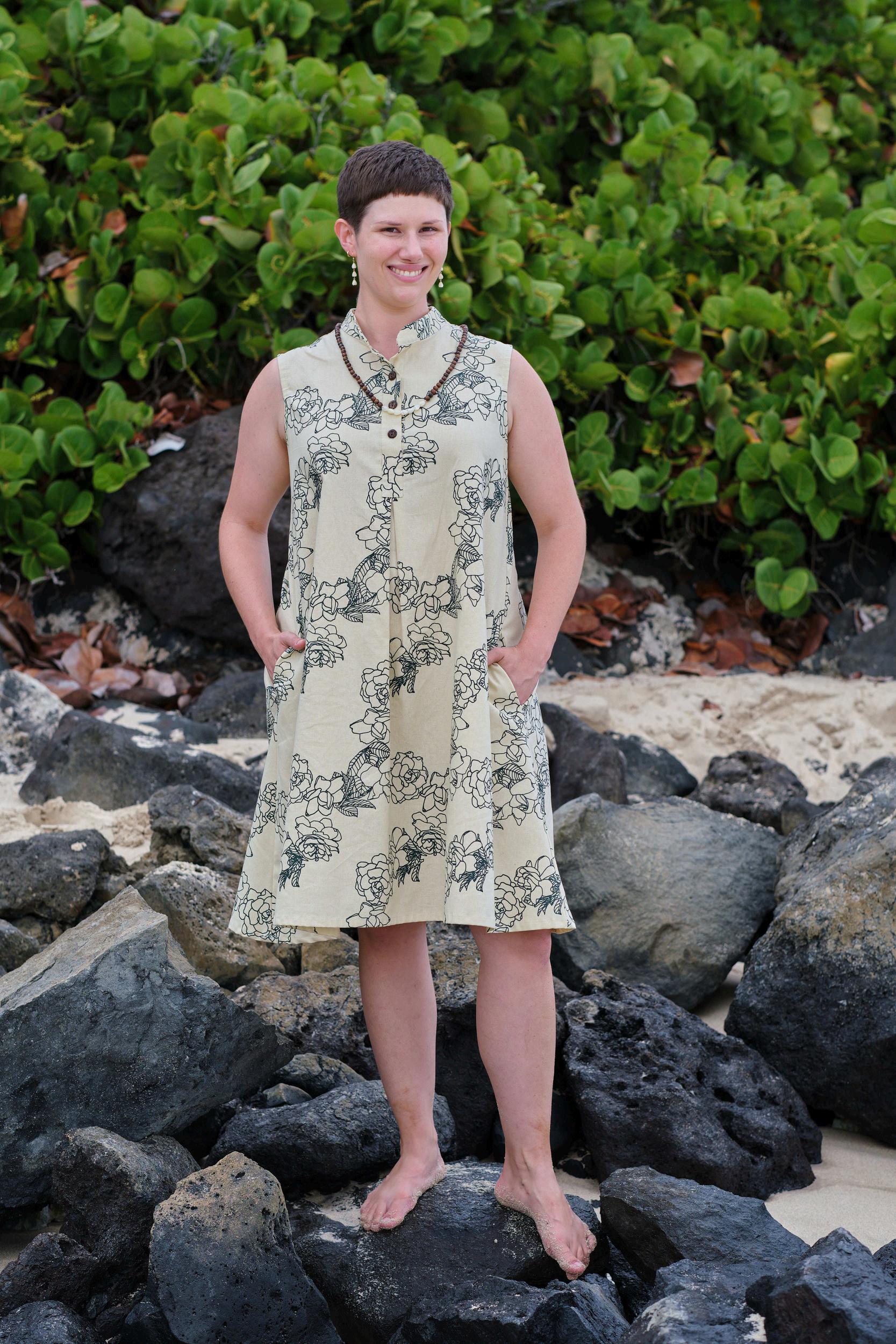
As always, I would love to chat about your thoughts and article ideas! I have included a call for articles with suggestions of topics to help you brainstorm (feel free to email me if you’d like some help!) and deadline information
Please contact me at: tactuseditor@acdawestern org
All the best, Olivia
Arnold Tactus Editor

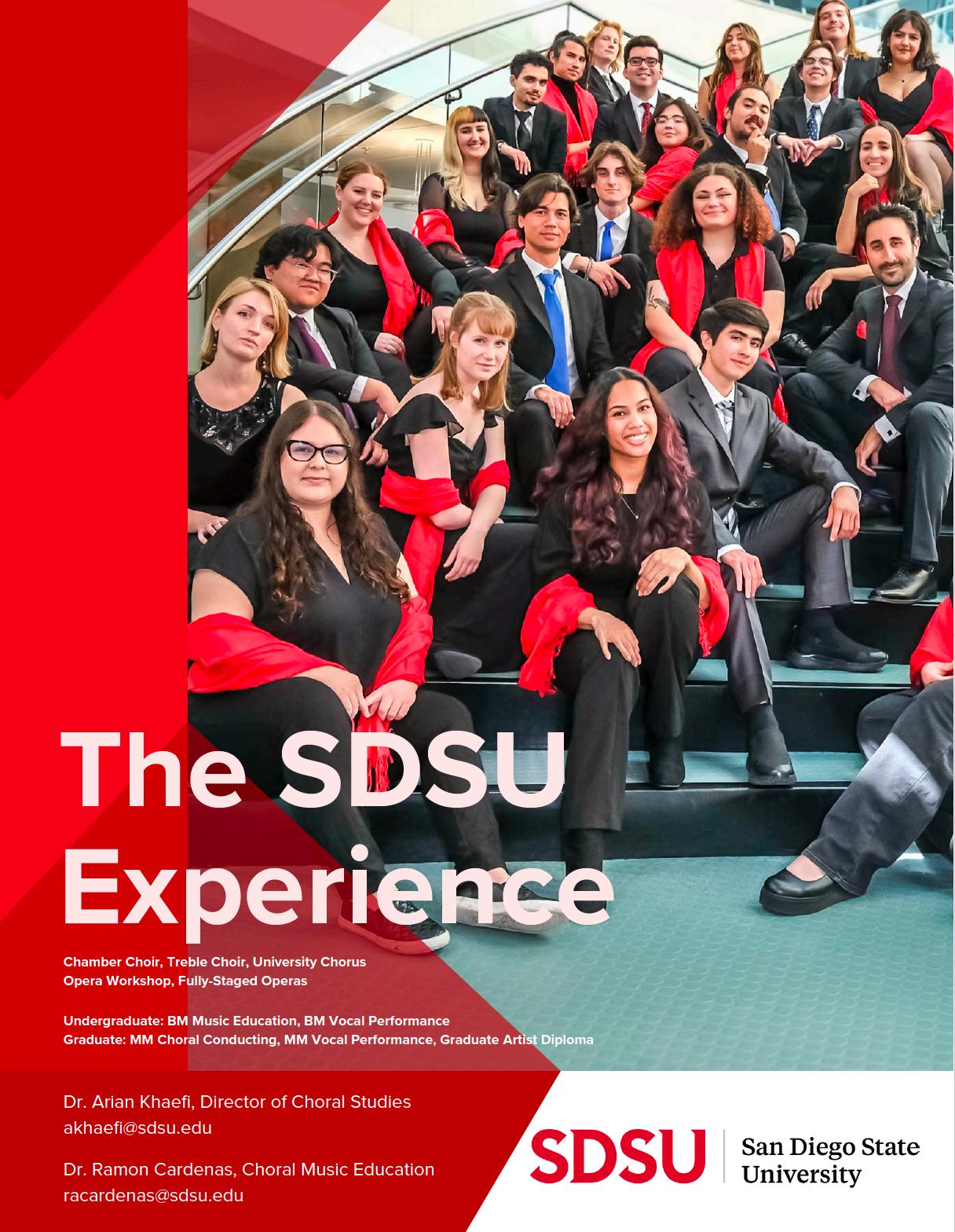
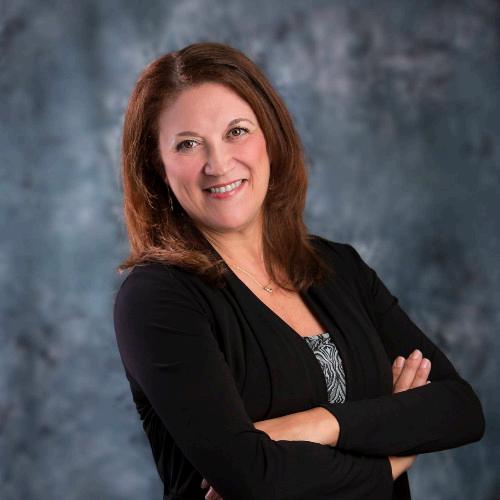
Happy New Year friends! I hope that you all took advantage of those rare quiet times at the end of 2024 and start of 2025 to reflect on your many blessings and share heartfelt times with those you love The promise of a “ new year ” comes with hope and expectation for positive things to come We try hard to look into the future, create life changing experiences for our singers, and make the world just a little bit better through our musical offerings.
Three years into my retirement, not long after writing my “brand new day” article in our fall Tactus issue, I launched into an unexpected “brand new day” as a longterm high school substitute Gone were my lazy mornings sipping a cup of my husband Mike’s perfect coffee as I contemplated the day ahead in my pajamas. As someone dear to me said, “Julie, you have failed at retirement!” And, like most everything I have done in my life, I jumped in! “Let’s start at the very beginning, a VERY good place to start!”
My previous experiences as a high school teacher -15 years worth 25 years ago -- gave me the strength to walk into that classroom with confidence and plans to share my passion with the young ones The request came one week before students were to walk through the door After talking it over with Mike, I agreed to “help out” four days before school started! How would I get the young ones to buy in to the “Dana” plan of choral excellence?
You know? In retirement, I have offered my “help and free time” to visit local classrooms to work with choirs, help play through their music (I’m not a pianist, but after 40 years can muddle my way through an octavo decently), and give the teachers pointers if they so desired I just wanted to offer my support in some small way Not many took me up on that offer, and I’ve had a hard time understanding why that was. In fact I’ve had the same discussion with many of my “retired” choral colleagues who want to stay involved and help perpetuate this profession we love so dearly! So when Dr. Edie Copley was in town and had an extra day and made that same offer to Julie, first year high school director in 2024, my reaction? “WHAT!?!? Uh Nooooo way!” That little Julie ego woke up “ you don’t want her seeing what you ’ re doing”, “they are not ready to be heard by anyone, let alone HER!”, “We can’t even sing through one piece”, and “Thanks so much for the offer Edie, but no! We aren’t ready for that kind of visit.”
If you know Dr. Copley, you know how compelling she can be, and she was not taking my fear and ego
problem as a “ no ” So, into my rehearsals she strolled with groups I had barely known a month. She worked with them and they listened and tried her suggestions while I began taking notes. Now I understand why directors are hesitant to take me up on my offer to enter their classrooms; however, my experience was the beginning of opening a door for them
My agreement to take the position came with the stipulation that I honor the many commitments that had already been scheduled: ACDA work, clinics, festivals etc I requested that Jordan, a young man with a masters degree in choral conducting who was also on the sub list, became the “sub’s sub” for those times that I could not be in the classroom. Together we would move this program forward.
On one of my days away, I was working with the high school choirs of one of my former students, now a colleague The ‘Julie on my shoulder’ whispered in my ear, “Why are you going to work with these choirs? You can’t even get the sound you want from your own choirs right now!? How can you go in and “help” someone else?” After the visit, Evelyn said, “You know, Mrs. D, (why can’t our former kids call us by our first names? Ha ha), it’s really good for you to be taking this job. Now you can see what we are dealing with in our classrooms.”
I’ve revisited that comment many times over the past four months, especially on days when my school inbox is filled with IEP requests, behavior paperwork, field trip request forms -- and provide in triplicate on the day of the trip because students didn’t turn it in until the last possible second -- all while I am slogging through a rehearsal from the piano because there is an accompanist shortage. I think on that comment also on days when students ask for a note to the nurse or restroom, can’t get off of their phones, or come in late in addition to all of the other disruptions to our rehearsal process… almost every day Or, when they come to class and clearly have other emotional issues going on that I have absolutely no way of knowing about Music isn’t the most important thing that day I remember that comment and am grateful that I see with different eyes, (and hear with more understanding ears), on what teachers are dealing with now, 25 years after I moved to the college rehearsal space. Through all of it, we have made music. We listen to choral ensembles in our warm ups and stretches to get their ears informed. We are now talking about phrasing and diction and expression We are building a community and learning to support each other I am “teaching them” and more importantly THEY are teaching ME!!! The world of education has changed drastically since I left my high school position in San Clemente and moved to
Fresno The demographics of these two locations could not be more opposite. And yet, their desire to learn and grow, with sometimes a little more nudging than I’m used to, is similar and we have traveled a wonderful journey. Saying “ yes ” was one of the best decisions I have made in quite a while. The singers have shared with me that it is nice to have someone who believes in them
It is now December, we have performed two concerts this semester We have attended festivals, we have had another esteemed conductor, thanks Dr Cari Earnhart, visit our classroom and work with us One of my former students, who joined the accompanist ranks in our district, has worked his schedule around his other schools to make time for us during the week and I finally get to stand in front of those singers now and then. I have reached out to friends/colleagues asking for repertoire advice as my most recent collegiate teaching experience did not require beginning level music like this and I had NO idea where to start! I am especially grateful to my former students, now teachers, who offer ME advice in dealing with this new student model and the challenges of public education. I have watched my singers grow and take pride in their performances and they have grabbed onto some of those heart strings that I just cannot keep tied up and hidden away no matter how hard I try.
So my “semester” with them will likely turn into a year, as I have agreed to stay on through the end of the school year to see what other wonderful adventures we will experience together They will continue to solfege and sight read, not their favorite, but definitely improving with daily practice. I have a few students participating in state and local honor choirs now. I have to learn about the past traditions so important to the seniors in their final months, while setting up a future of community building for the director who will come to them next They will make this old gal a little crazy from time to time, and that’s okay My friends and colleagues will continue to receive calls about repertoire choices, classroom management, festival opportunities and general choral director counseling sessions
Although I appreciate the sentiment I have often received “They are so lucky to have you”(Usually after the: ‘WHAT!? You are doing what!? Are you nuts?’), it is really the opposite, I am so lucky to have them as I have missed standing in front of a choir since I retired. My heart fills with what I am experiencing now: A beginning student who has some language processing issues but showed up in a suit and tie and expressed the music so beautifully at our performances Another beginning student who says nothing in class, was suspended as soon as school was in session but once back, quietly, in my ear, made a contribution to lyrics that I requested the class contribute to a community song we were performing.
(That verse is at the end of this article, her line “ so we ’ re not alone”) The top ensemble who had little reading and listening skills initially that is contributing harmony and choral sound to selections in just a few rehearsals now. The small ensemble that felt they were not part of the “in crowd” of singers, singing a beautiful, mostly unison, piece with heart and beauty for an audience inspired by their song So many things I have learned in these 4 months as a first year high school director but one thing that has not changed is how I marvel at the resilience of young singers and their ability to “step up ” if you challenge them, no matter how much they resist. I have been reminded of how life changing choral music can be to students of ALL ability levels if you give them a chance and educate the leadership around you. It IS contagious, my friends -- we are so fortunate to do what we do!
This experience is a part of MY tapestry of voices My connections through ACDA, have given me the resources to reach out and get help when I need it I will likely invite others to come into my classroom this semester and let my kids see what an amazing community looks like I will carry these experiences with me into our 2026 Conference in San Jose, California and hopefully will see a couple of my former students participating in the honor ensembles! I hope you will join us as a participant, interest session presenter, performing ensemble conductor, composer or exhibitor this conference is going to be a beautiful celebration of the awesome work we do together to share the choral art with the world! Please be sure to read about our plans in this issue of Tactus and get ready for our Conference Calls coming soon! My students could have written this verse for us as our “charge” and so I leave with you their lyrics & voices:
Together we can save the world, so we ’ re not alone!
Let’s RISE with love and energy, and bring peace to our home!
- Period 1 Mixed Chorus
Thank you for inspiring your singers and, through them, inspiring us all!
BY JULIE DANA

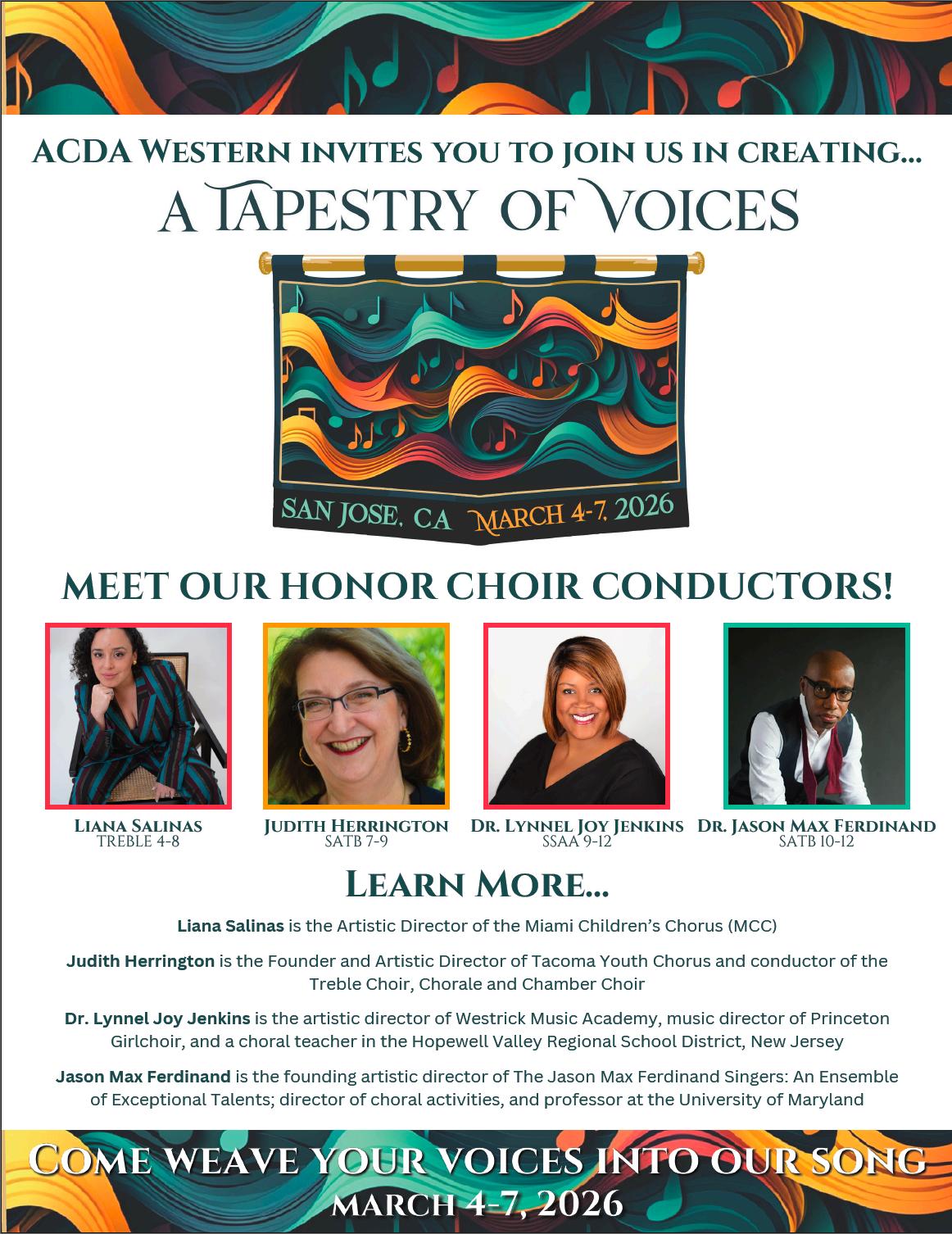
BY CARI EARNHART
San Jose, CA – March 4–7, 2026
I am once again honored to serve as your Western ACDA Conference Chair They say “third time’s the charm” and the conference team will be working diligently over the next several months to deliver on that promise. We are excited to invite you to join us for the 2026 ACDA Western Region Conference in the vibrant city of San Jose, California, from March 4–7, 2026 We are thrilled to be returning to San Jose after 40 years! Together, we will celebrate the rich tapestry of choral music through engaging educational sessions, meaningful collaborations, and unforgettable performances to celebrate the transformative power of choral music.
The conference will feature inspiring performances, insightful educational sessions, and opportunities to connect with colleagues across the region. Whether you ’ re seeking fresh ideas, meaningful collaborations, or simply a chance to celebrate the joy of choral music, this event has something for everyone
Are you ready to share your talent or expertise? Do you know a colleague/friend doing awesome work that we need to hear from? We will soon be accepting applications for conference performers and interest session presenters! This is your chance to showcase your choir, present innovative ideas, and contribute to the success of our shared choral community Please read our Performance and Interest Session calls on the following pages
Stay tuned for more details and mark your calendar. Let’s make the 2026 ACDA Western Region Conference a truly unforgettable celebration of choral music!
You don't want to miss this opportunity to connect and grow within our vibrant choral community! It’s a time to learn, collaborate, and be inspired as we explore the future of choral artistry together
We’re excited to announce our four Honor Choirs for 2026! These ensembles will feature talented singers from across the region and will perform under the direction of renowned conductors:
4th - 8th grade Unchanged Treble - Liana SalinasMiami Children’s Chorus 7th - 9th grade SATB - Judith Herrington - Tacoma Youth Chorus
9th-12th grade SSAA - Lynnel Joy Jenkins - Westrick Music Academy, Princeton Girlchoir, and Hopewell Valley Regional School District
10th-12th grade SATB - Jason Max Ferdinand - Jason Max Ferdinand Singers, and University of Maryland
Audition information will be released later this Spring Encourage your singers to apply for this incredible opportunity to grow musically, connect with peers, and be part of something extraordinary Stay tuned for more details about applications and deadlines. Be sure to check out our website and follow us on social media, so you don’t miss out on these amazing opportunities!
Mark your calendars for March 4-7, 2026 and join us in making the 2026 ACDA Western Region Conference an unforgettable celebration of choral music!
The ACDA Western Region (WACDA) welcomes submissions for innovative, applicable and inspiring interest sessions for our 2026 conference We encourage submissions that address the conference theme A Tapestry of Voices, the depth and breadth of our membership and sessions that actively engage participants. All topics will receive consideration and will be evaluated for scholarly content, variety, innovation, value, pedagogical strength, and relativity to current trends in the choral profession. A detailed rubric for evaluating proposals will be provided on the conference website.
All proposals must be submitted online. Please follow the steps and considerations below to prepare and submit your proposal
1 Session Title: The title should be carefully crafted, brief, reflective of the session’s content, and be no longer than 60 characters and ready to appear in the app/conference program
2. Session Abstract: A succinct thesis that addresses (1) a topic that will be helpful and/or inspire the membership, (2) a clear description of the session, and (3) learning outcomes. Please submit the following using the application form: ------------------a. No more than an 1800-character description, which will be used in the conference app. ------------------b. No more than a 900-character description, which will be used in the Choral Journal announcement ------------------c. A brief outline in bullet points or a standard outline of your session (limit two pages). Upload pdf in the application form
3 Submissions will only be considered from current members of ACDA Lapsed or non-members will not be considered
4 Presenters submitting multiple proposals, if selected, will only be allowed to participate in one presentation This includes being a co-presenter.
5. For group presentations, no more than 5 people, including a moderator are allowed. Only the originally submitted names in the application, may present. If a presenter within a team must withdraw from the presentation, no substitutions will be allowed.
6 Indicate if this session would require a demonstration choir All demonstration choirs must be adjudicated ------------------a If you wish to bring your own demonstration choir, submit the following: Three audio submissions They should include representative examples of the choir’s performances in each of the last three academic years (September through August) Each recording should be a complete work and should be no more than 3-5 minutes in length.
one selection from the 2024–25 academic year or 2025 calendar year; 1. one selection from the 2023–24 academic year or 2024 calendar year; 2. one selection from the 2022–23 academic year or 2023 calendar year. 3. ------------------b. If you prefer to request a demonstration choir from selected performing ensembles, please indicate that in the submission
In addition, you will be asked to provide the following information:
Indicate if you would like your session to be considered for the best practice poster session if not selected for presentation 1 Session Target Audience/Area of Interest. Select one primary and one secondary audience. 2. ------------------a. Classroom/General Music ------------------b. Elementary Choral
Middle School/Jr. High
High School
2-Year College
University
------------------g Community
iii3 Indicate if a demonstration choir will be a part of your session Provide the name of the ensemble and conductor Please note: If you plan to use a demonstration choir, you must also submit an application for the choir within the interest session application. (please see # 6 above for specific information).
iii4. Equipment needs. Every room will have a projector and screen for audio and video. All other equipment requests must be listed on your proposal. Please note: Not all rooms at the conference center will have a piano. If you do not request a piano on your application, then we may not be able to accommodate this request at a later date.
iii5 Contact information including name, email, phone, address, and name of school/institution
iii6 ACDA membership number Please note: All applicants/presenters at an ACDA Conference must be current members of ACDA; must be members at time of selection and membership shall not expire on or before the last day of the Conference
The ACDA Western Region invites submissions for research and best practice poster presentations. We encourage submissions that address the conference theme A Tapestry of Voices, the diversity of our membership, and are theoretically grounded Presenters will also have the option to participate in a private small group mentoring session before the poster session
All proposals must be submitted online
Research Posters:
Submissions involving quantitative, qualitative, mixed methods, historical, or philosophical topics related to any -------------aspect of the music teaching and learning process will be considered. Graduate students who are working on or -------------who have completed theses, dissertations, or monographs are encouraged to submit their work for consideration.
Best Practice Posters:
-------------Submissions describing teaching practices, programs, or any aspect of teaching and learning will be considered -------------Submissions should include a summary of the topic and a description of the context in which it has been or can be -------------implemented if applicable Topics can include, but are not limited to: instructional strategies, teaching techniques, -------------composition techniques, literature/programming suggestions, choral/vocal pedagogy, technology, classroom -------------management, curriculum design, retention, recruitment, advocacy, assessment, and evaluation.
Please follow the steps below to prepare and submit your proposal.
Prepare a description or bulleted outline of your poster presentation not to exceed 1800 characters. Upload a PDF 1. Poster title to appear in the conference program if selected 2
In addition, you will be asked to provide the following information:
1
2.
Contact information including name, email, phone, address, and name of school/institution
Mentor Session: Are you interested in meeting one hour before your poster session with a mentor from your poster area? Past private sessions have been small groups or 1:1 dependent upon the area of expertise. Indicate if you would like to meet with a mentor before your poster session.
3.
ACDA membership number. Please note: All applicants/presenters at an ACDA Conference must be current members of ACDA; must be members at time of selection and membership shall not expire on or before the last day of the Conference
ACDA does not offer compensation or artistic fees for presenters. All related expenses will be the responsibility of the presenter.
Presenters are expected to officially register for the conference event at the posted registration rates
Application and Information Timeline:
Application opening in February 2025
Applications for Interest and Poster Sessions Due: April 1, 2025
Help desk support is available until 5:00pm central time on April 1, 2025. After that time, no support will be provided, even if technical issues are encountered. The help desk can be reached at membership@acda.org. Applicants are encouraged to plan ahead to ensure they can complete the submission process. The platform assigns each submission a number to ensure confidentiality An incomplete upload of the application materials listed below will not be considered Late submissions will not be accepted for any reason
Letters of Acceptance/Rejection Sent to Applicants starting: June 15, 2025
Information Letter to Presenters: Mid-August 2025
Any changes to Presenters’ Bios/Info Due: September 1, 2025
Demonstration Choir Photos for Choral Journal/ACDA App Due: September 25, 2025
Information Letter to Presenters: Mid-November 2025
Final Information Letter to Presenters: Early February 2026
ACDA Western Region (WACDA) is extending an open invitation to performing groups for the 2026 A Tapestry of Voices regional conference in San Jose, California. We encourage submissions from conductors and choral ensembles that address the conference theme A Tapestry of Voices, highlighting the depth and breadth of our membership and how our individual threads intertwine to create a stronger musical fabric. Acknowledging the unique value of each ensemble, applicants will share how they connect within their communities and embody the conference theme
The ACDA Western Region’s 2026 conference, A Tapestry of Voices, weaves together the stories of our region, celebrating the ensembles that amplify voices from all perspectives Each performance thread contributes to the rich musical fabric that defines our communities and our shared journey as musicians We are seeking to feature regional performing ensembles that share in the beauty of their musical tapestries through performance, advocacy and community outreach.
Submissions will only be considered from current members of ACDA. Lapsed or non-members will not be considered.
A non-refundable application fee of $25 is due at the time of submission and can be paid by debit/credit card only.
CHOIR R&R AREA AND VOICING: Choirs are asked to self-categorize as follows:
a. Ensemble Type (select the ONE R&R area that best describes your ensemble): ------------------i. Children’s and Community Youth (include age range/grades of singers) ------------------------------------a. Singers in this ensemble are in grades 3-5; fill in % of students in the ensemble
------------------------------------b. Singers in this ensemble are in grades 5-7; fill in % of students in the ensemble
------------------------------------c. Singers in this ensemble are in grades 7-9; fill in % of students in the ensemble ------------------------------------d Singers in this ensemble are in grades 9-12; fill in % of students in the ensemble ------------------ii Junior High/Middle School
------------------------------------a Small school; 799 and below students
------------------------------------b Large school; 800 and above students
------------------iii Senior High School
------------------------------------a. Small High School (9-12 enrollment 799 and below) ------------------------------------b. Large High School (9-12 enrollment 800 and above)
------------------iv. Two-Year College
------------------v. Four-Year College or University ------------------vi. Contemporary A Cappella ------------------vii Show Choir ------------------viii Vocal Jazz ------------------ix Community
------------------x Music in Worship (choirs who primarily serve/perform in worship rather than concert settings) ------------------xi Professional b. Voicing ------------------i. Soprano-Alto ------------------ii. Tenor-Bass ------------------iii. Mixed Voicing
ENSEMBLE STATEMENT (non-adjudicated) - Applicants are asked to share a narrative about their ensemble without identifying the name of the ensemble or the conductor Can include the type of institution/organization, ensemble history, and mission, philosophy, and legacy of the ensemble; who participates in the ensemble; the surrounding community that the organization serves; and the programming practices of the choral ensemble in 1800 characters or less to help the committee contextualize your ensemble.
-------------a. The ensemble’s biography (900 character maximum).
-------------b. The conductor’s biography (900 character maximum).
-------------c The conductor(s) headshot in jpg format, 3” x 5”, high-resolution minimum 300 dpi
-------------d An ensemble photo will only be requested for choirs selected to perform
-------------a. Director’s name, phone, e-mail address, ACDA member number
-------------b. Name of institution (spell out do not use abbreviations), City and State, Exact name of choir, and number of singers in the ensemble
MATERIALS FOR CHOIRS EXCEPT CONTEMPORARY A CAPPELLA & SHOW CHOIRS (CONTEMPORARY A CAPPELLA & SHOW CHOIRS SEE NEXT SECTION):
-------------a Three recordings in digital format (Unedited, live recordings No videos will be accepted ) based upon the following specifications:
--------------------------i One selection from the 2024–25 academic year or 2025 calendar year;
--------------------------ii. One selection from the 2023–24 academic year or 2024 calendar year;
--------------------------iii. One selection from the 2022–23 academic year or 2023 calendar year;
--------------------------iv. Files are unedited, complete pieces. Each file should be only one piece of music and should not consist of multiple songs.
--------------------------v. Files should correspond with the years of programming represented in the program documents.
--------------------------vi Files submitted are contrasting selections to illustrate the breadth of the ensemble’s repertoire and ability
--------------------------vii Files have no mention of the ensemble or conductor’s name in the recording Any identifying information will disqualify the application (this helps to ensure unbiased listening on the part of the audition committee)
--------------------------viii. Please name the recording file as follows: Conductor’s ACDA Membership Number + Choir Type + File Number (i.e., 1234567HSSATB2.mp3)
-------------b. Three performance programs scanned in pdf format as proof of conducting and programming for each year represented on the recordings (Be sure to remove ALL identifying information from programs)
--------------------------i. Documents are representative of the auditioning group ’ s programming.
--------------------------ii Programs should correspond with the recordings represented in the audio file submissions
--------------------------iii Remove all identifying information from programs, i e , conductor name, school name, logos, etc Failure to do so will result in disqualification of your application Reminder: to maintain anonymity of the selection process, videos will not be considered
-------------a. Submit three video recordings (or six for co-conductors; see Section I) that include both audio and video in digital format. The total duration of the three recordings should not exceed 10–15 minutes (20-30 minutes if co-conductors submit six recordings).
-------------b Include selections from each of the last three academic years (September through August) with the same conductor
--------------------------i One selection from the 2024–25 academic year or 2025 calendar year
--------------------------ii One selection from the 2023–24 academic year or 2024 calendar year
--------------------------iii One selection from the 2022–23 academic year or 2023 calendar year
-------------c. Video files should not be edited in post-production and must be performed by the same conductor and ensemble; live performances are preferred.
-------------d. Videos should reflect repertoire similar in complexity and style to the sample program, though they need not include pieces on the sample program.
FOR ALL SUBMISSIONS: Proposed repertoire for the 2026 conference
-------------a. Include title, composer, and approximate performance time in minutes and seconds.
-------------b. Total program time may not exceed 25 minutes including stage set up, entrance, exit, and applause.
-------------c ACDA encourages conductors to program a variety of styles from various eras unless proposing a concert by a single composer or genre When you submit your application, your proposed program is part of your application and approval
*In special circumstances, the Conference Committee may consider petitions to change repertoire after invitations have been issued, between August 15-October 1, 2025. Changes impacting more than 20% of the total performance time will not be considered. Approval of changes are at the discretion of the Conference Committee Chair.
-------------d. No more than one manuscript (unpublished) piece may be included; -------------e. The use of photocopies or duplicated music at ACDA conferences is strictly prohibited. -------------f Indicate willingness to participate as a demonstration choir, if selected
All applications must be submitted with non-refundable $25 00 application fee online at the link provided by ACDA Western Region by April 15, 2025 Help desk support is available until 5pm central time on April 15, 2025 Help desk is NOT available on the weekends After that time, no support will be provided, even if technical issues are encountered Applicants are encouraged to plan ahead to ensure they can complete the submission process. Late submissions will not be accepted for any reason. Help desk can be reached at membership@acda.org.
The director of an ensemble applying for choral performance at an ACDA Conference must be a current member of ACDA; must be a member at time of selection and membership shall not expire on or before the last day of the Conference
The director of the ensemble must have been employed in the same position for no less than three consecutive years prior to the application (since Fall of 2022).
Co-conductors for a particular ensemble will submit ONE application for performance if all the following conditions apply:
Both conductors are ACDA members and have been co-conductors of the ensemble for at least three consecutive years
Both conductors share an equal or similar leadership role with the ensemble Shared leadership must be clearly evident in the submitted programs
Co-Conductors submit their own three recordings and programs totaling 6 uploads (3 per conductor) for the ensemble.
No ensemble or director may appear at successive National or successive Region Conferences. Ensembles that appear at a National Conference may audition and appear at the following Region Conference and vice versa. Ensembles that appeared only as a demonstration choir are exempt from this rule.
Choral ensembles and conductors that appeared at the 2024 ACDA Western Region Conference in Pasadena will not be eligible to appear in the 2026 ACDA Western Region Conference in San Jose
It is understood that ACDA Western Region will not assume financial responsibility for travel, food, or lodging for conductors or choir participants. Submitting an application implies that the ensemble is prepared to travel and perform at the conference if accepted.
No recorded accompaniment may be used on an audition recording or in performance at an ACDA Conference. Only live accompaniment is permitted
Screening Process
All audition applications will be handled via the ACDA online system to ensure a fair and unbiased review of all submissions.
Reading the stories of applying choral organizations will be key to the selection process. Any identifying information included within application materials will be redacted by Conference Performing Group Co-Chairs in order to ensure an equitable and blind listening process among conference listening panels. Listening panels will select performing groups without specific knowledge of the identity of the choir or conductor
Application and Information Timeline:
Application opening in February 2025
Applications for Performance Choirs Due: April 15, 2025
Help desk support is available until 5pm central time on April 15, 2025. Help desk is NOT available on the weekends. After that time, no support will be provided, even if technical issues are encountered. Applicants are encouraged to plan ahead to ensure they can complete the submission process. Late submissions will not be accepted for any reason Help desk can be reached at membership@acda org
Letters of Acceptance/Rejection Sent to Applicants starting: June 15, 2025
Information Letter to Performing Choirs: Mid-August 2025
Performance Choir Bios/Info Due: September 1, 2025
Performance Choir Photos for Choral Journal/ACDA App Due: September 26, 2025
Information Letter to Performing Choirs: Mid-November 2025
Final Information Letter to Performing Choirs: Early February 2026

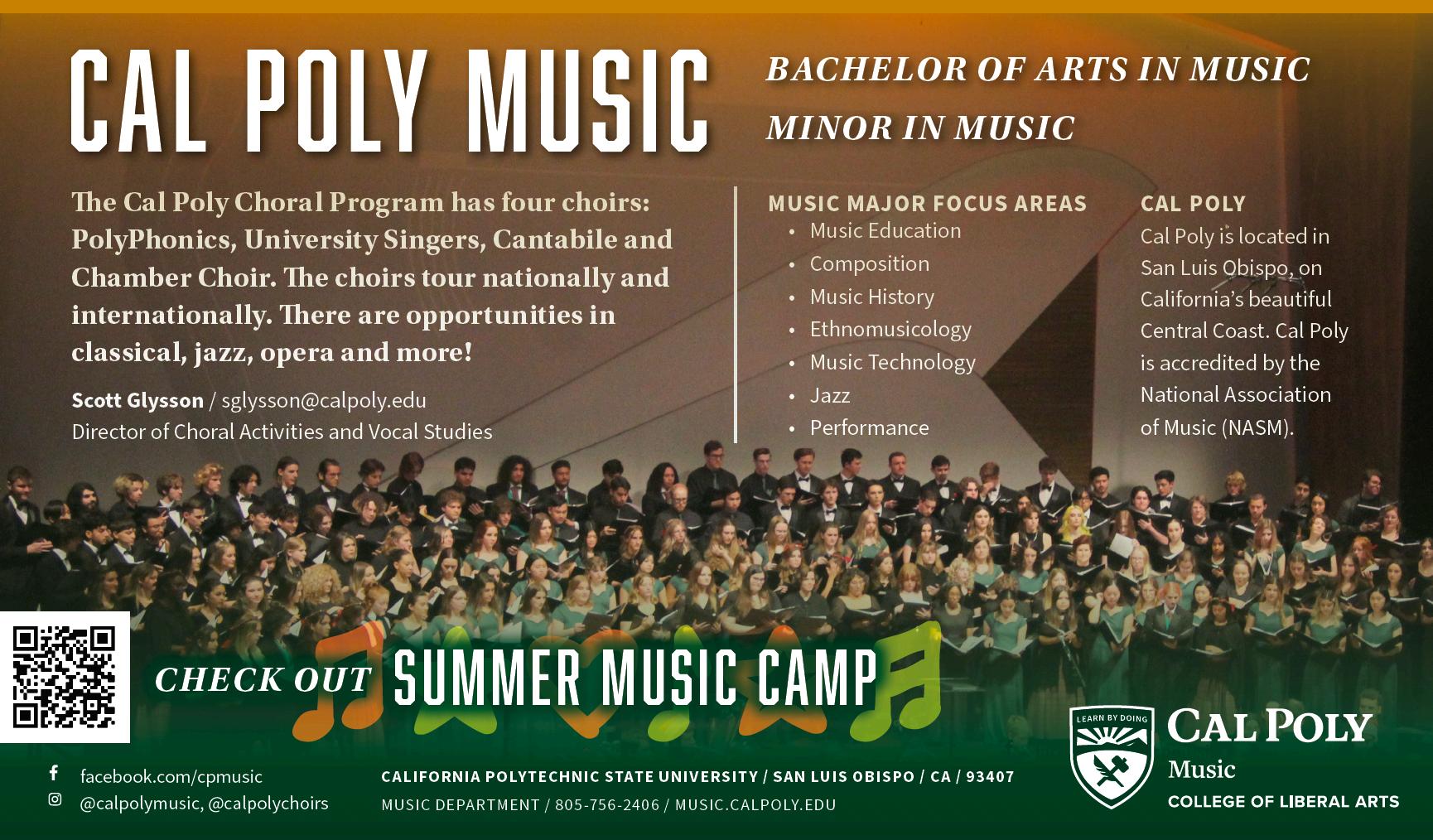


DAVID K. PALMER, MD
As an otolaryngologist, my favorite patients are vocalists. Aside from my bias as a tenor, I find that singers are highly motivated to recover from vocal health issues. Singers generally are eager to return to work, and, in some cases, just a few hours before a performance As medical director of the Tabernacle Choir and orchestra, I was charged with finding a safe return plan following the Covid pandemic Group singing and playing wind instruments elevated SARSCoV-2 transmission risk due to increased emission of respiratory particles. We were aware of multiple COVID19 outbreaks after exposure during choral singing, including March 2020 outbreaks in Washington state (87% attack rate) and France (70% attack rate). Despite the risk, a volunteer medical team was formed to determine a solution
Fortuitously, the choir president had served under President George W Bush as Secretary of Health and Human Services and was familiar with pandemics Additionally, multiple choir and orchestra members had medical backgrounds in epidemiology, medical technology, nursing, and pharmacology.
We chose a layered COVID-19 prevention protocol similar to the “Swiss cheese” model. This layered approach recognizes that no single layer is perfect and has some gaps; however, as layers are stacked, the gaps begin to disappear Our Covid prevention protocol required vaccinations, pre-event rapid antigen testing, exclusion and isolation, post-exposure notification and testing, liberal long-term leave, online rehearsals, wearing face masks indoors, physical distancing, and self reporting of symptoms.
Thanks to the cooperation of everyone involved, we were able to return to full ensemble singing by October 2021. We continued investigating potential transmission of COVID-19 at our choir events and found that the prevention protocols were successful: a public health study reported that minimal transmission occurred at our choir events Perhaps the most remarkable impact during this time was the strength of volunteerism from participants in the choir, orchestra, medical committee, and support staff. I admired musicians’ drive to express their talents despite the barriers across the United States and beyond. Musicians want to perform, recover from illness, and cooperate to make even a potentially lethal pandemic possible to overcome.
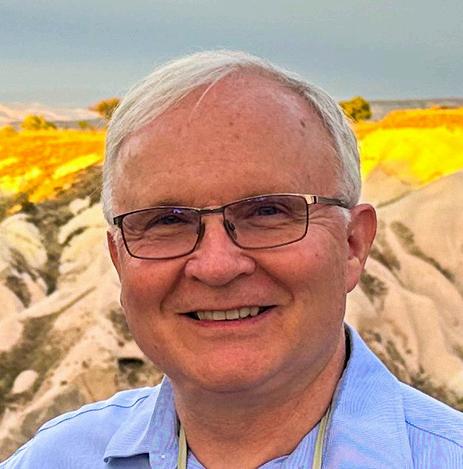
David K Palmer, MD, FACS, is a board-certified otolaryngologist with over 30 years of practice in Salt Lake City, Utah. Dr. Palmer’s education includes the University of Utah, Harvard, the Medical College of Pennsylvania, and Penn State.
A respected figure in his field, Dr Palmer has served as president of the American Academy of Otolaryngic Allergy (2010-2011) and as Medical Director of the Tabernacle Choir at Temple Square since 2016. His passion for music is evident from his 15 years singing tenor in the choir. This unique combination of medical expertise and musical talent allows Dr. Palmer to provide a comprehensive approach to his professional voice patients Outside his profession, Dr Palmer treasures his wife of 48 years, Elizabeth, their five children, and 13 grandchildren Their daughter, Aimee Stewart, is president-elect of ACDA Western Region
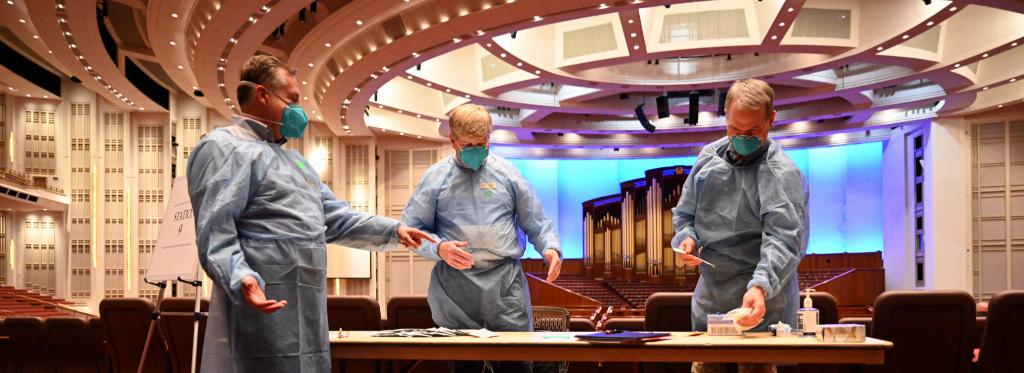



BY GREG HEBERT
Many of us remember former choir directors, professors, and private instructors who have blessed us with the gifts of enthusiasm and wisdom. In graduate school, I was fortunate to have Donald Bailey as a teacher and mentor. In repertoire and conducting courses, we would examine major works, large collaborative ideas, and some of the most classically beautiful repertoire But, when leaving the ivory towers of the university and getting into the nitty gritty of public school teaching and working with volunteer church choirs, I thought that kind of work was just something that only “professor types” and professional groups did.
For a few years, I taught K-8 and worked in Catholic Churches with small ensembles. We sang from the Hal Leonard catalog and Oregon Catholic Press, respectively. In 1994, Corona Del Sol High School in Tempe, Arizona took their chances by hiring me, and I was delighted to finally lead a choir program that could sing SATB The program was well-established by excellent predecessors and had large community support I desired for my high school students to sing in as many venues as possible - a taste of everything! Why just sing in the auditorium? Beyond the auditorium, we could sing at the cafeteria, gym, football field, church, mall, or state public office.
When we were asked to sing at a neighboring LDS church during the Christmas season, I was a little apprehensive My concern was that I could be showing favoritism toward a certain group, or perhaps the perception would be that I favored one group over the other, etc All the doubts!
So, I called my veteran teacher friend with my doubts, and he assured me there was nothing to worry about. In his words, “it’s a venue with an opportunity to sing.” After his affirmation, we performed, and it was a lovely time. The students who were not LDS had an opportunity to get a glimpse of beauty in the church building and were surrounded by a wonderful and appreciative audience
In 2005, I was hired to direct music and the SATB choir at St Thomas the Apostle Catholic Church, in Phoenix. At that time, I had been teaching at Corona Del Sol High School in Tempe for ten years. I was comfortable directing the choir program and had the thought: why not combine these ensembles for a concert? It was, after all, a stunning venue both in sight and sound, and there could be plenty of music for a full concert So, I invited the pastor of the church, the school principal, and staff members We did it!
Like my father would say, “Start small and build from there.”
Since 2008, we have continued singing together in shared concerts:
2008 Vivaldi Gloria
We started with something accessible to HS and church choir, choosing several movements from the entire work. It was a fresh and good start. Students from the school orchestra were included.
2009 Handel Messiah
We sang excerpts from the entire work, and the audience was able to hear the church perform and the students individually and together
2010 Britten Ceremony of Carols
This was so much fun! The inclusion of our intermediate women ’ s chorale brought even more people together. A professional orchestra was hired, and from that point forward we performed with professional instrumentalists Some of my students thought harps only played in hospitals and at funerals! This was a wonderful, collaborative experience for all
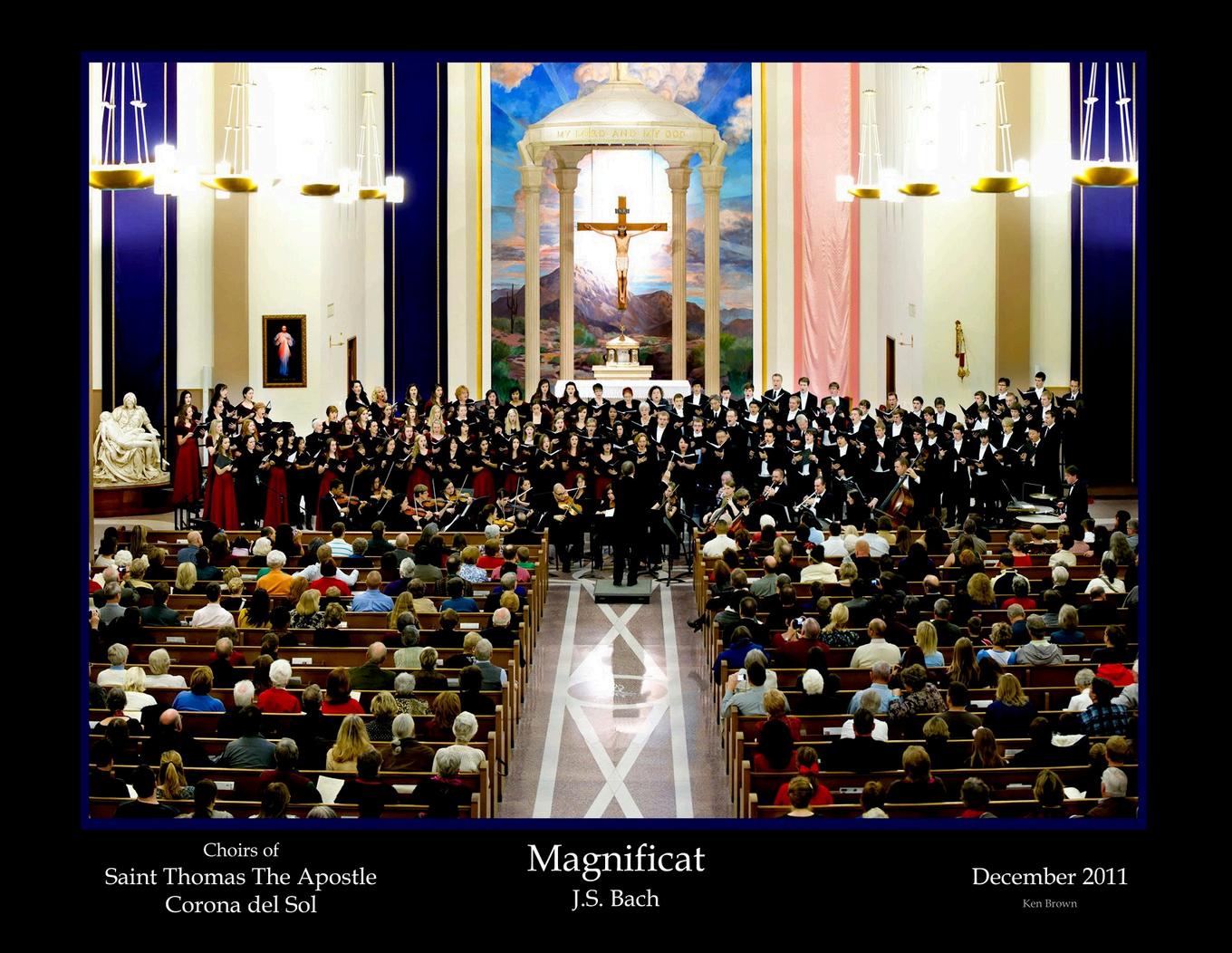
2011 Bach Magnificat
We took a giant leap of faith on this one, but we had a strong concert choir that year I invited college professors to advise, give me pointers, and explain directing Baroque techniques.

The idea to perform the Mozart Requiem came about as we began collaborating with Brian Dehn at St Boniface Catholic Church, Anaheim I met the previous director, Emett Loera, at the 2008 WACDA conference and there we discussed performing the Rutter Requiem in 2009, followed by the Faure Requiem in 2011 in Anaheim. Mozart was such a favorite that we performed it again in 2019!
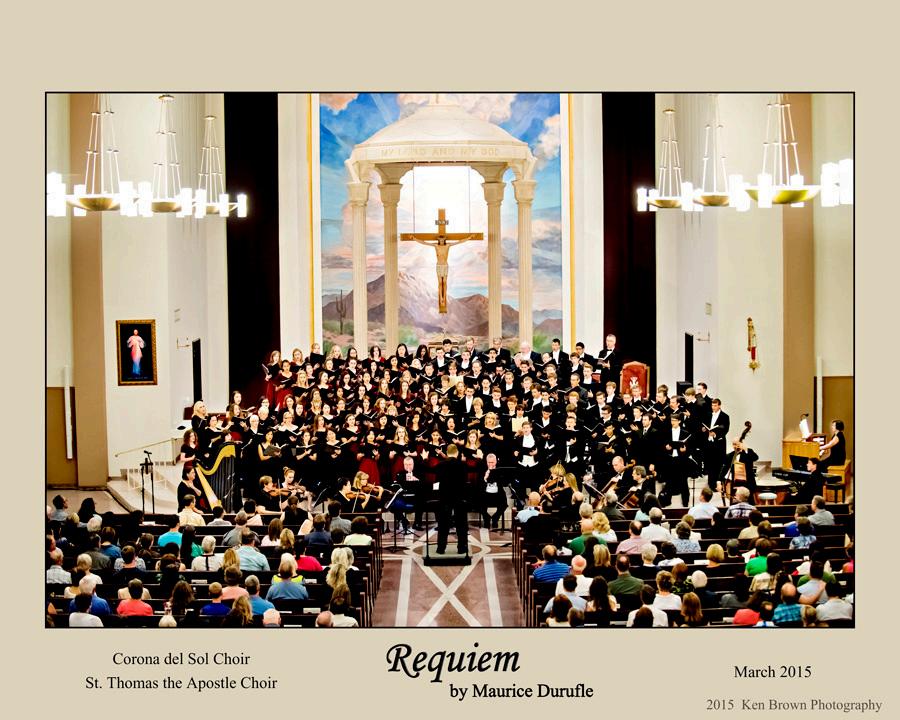
The HS concert choir performed with the adults at St. Thomas and St. Boniface. That summer we performed at the AzACDA Summer Conference at Camelback Bible Church in Phoenix.
This time, choirs of all levels and ages joined from all over the Phoenix area to perform. We sang combined opening and closing songs, similar to an honor choir.
Due to restrictions on travel and collaboration, no major works were performed in 2020-2021. After thirty years of teaching, it was time for me to step down and hand the baton over to a new choir director at the high school Meanwhile, the spirit of collaboration continues at St Thomas the Apostle with schools in the Phoenix area, andwithAndrewDeValkofCoronaDelSol,andthechoir students.
I asked Kay Umberson, a long-time elementary music teacherinArizona,memberoftheSt.ThomastheApostle Adult Choir, and wise mentor, to share her thoughts on collaboration:
Aren’t we lucky to meld the youthful spirit with the adult everyday world? Through mutual respect and validation, students and church communities can have meaningful musical experiences How? We should ALWAYS prioritize and produce QUALITY music When choir directors share music from a place of empathy and love for this wonderful art, it can make powerful products.Musicalcollaborationshighlighttherichnessmusiccan providetoourlives:
Self-respect and self-esteem: it isn’t about ego, but the tiny daily acts of humbly making a difference in the lives of people
Invite students, parents, teachers, and church communities fromavarietyofprofessionsandmusicalabilities. Nevergiveup,neverstopgrowing
Laugh at ourselves and find the spontaneous, memorable humor!
Appreciate,recognize,andhelpdevelopuniquetalents.
Combining ages in concerts and rehearsals shows young students continuityandthefuture Inturn,whenstudentsshowtheirtrue spirit, the community choir is uplifted from daily trials with student joy! What a blessing we delight in: that God gave us musictogivetoothers

Greg Hebert serves as Music in Worship R&R for Western Region and AzACDA, and for several decades has served in various roles of ACDA leadership At St Thomas the Apostle, in Phoenix, he directs two adult choirs, two children’s choirs, and coordinates all musical functions for the parish He has fond memories of teaching high school and has enjoyed over 35 years as a teacher and musician in Arizona
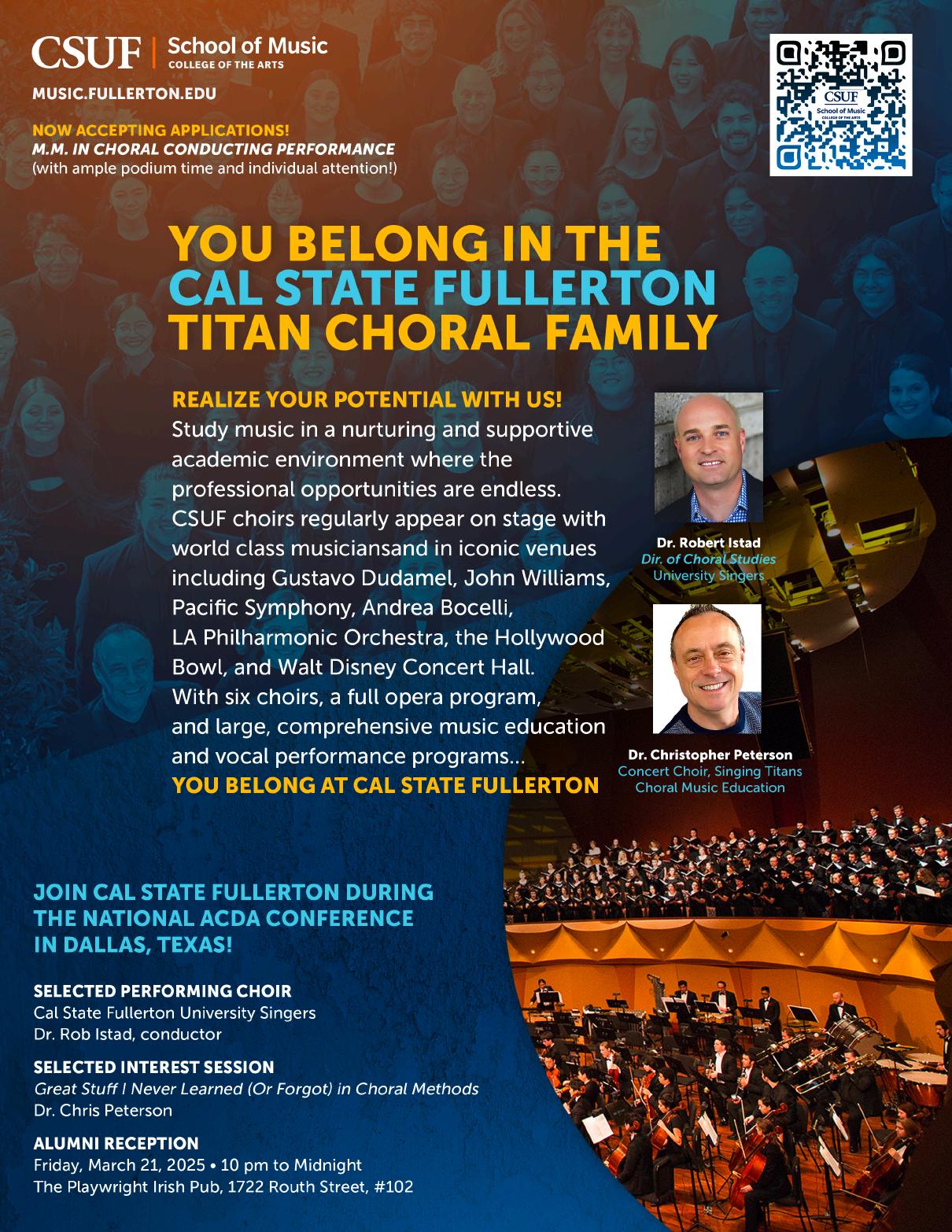
BY JENNIFER LOWRY
In this continuing section of Tactus, the voices of our retired/long time colleagues are featured Professor David Weiller was interviewed by Nevada ACDA State President Jennifer Lowry, an 18 year middle school director in Clark County. She sang under his direction in the Las Vegas Master Singers.
How long have you been a member of ACDA?
I joined ACDA, I believe, in 1980 when I was in graduate school at the University of Illinois. My graduate professor was Dr. Harold Decker, a founding member of ACDA This meant all the graduate students automatically joined ACDA, and we all went to the national conference in the spring of 1981 in New Orleans. My first memory of that national conference was the night before when we were rehearsing the Bach “Saint Matthew Passion” with Dr. Decker. Afterwards, our group of graduate students all drove through the night from Champaign, Illinois to New Orleans in order to get to the conference before it started at 9:00 AM the following morning!
And what was your main area of conducting?
I spent my entire career in university choral conducting. I also worked with music education in support and preparation of young teachers.
Who or what inspired you to become a choral director?
Oh, I knew from an early age. I decided in kindergarten that I was going to become a teacher. I started piano lessons when I was 9 and started accompanying choirs in 6th grade Then I accompanied every year at whatever school I went to By 8th grade, I knew I was going to be a music teacher. I knew I was going to be a choir director by the time I was in high school, really. My high school choir teacher was James A. Young who influenced hundreds and many generations of young people from all over the country He taught for about 40 years, and I had him near the end of his career in Southern California. We sang college level repertoire all the time. I was exposed to so much quality repertoire as a high school student, it was amazing. My undergraduate professor at Occidental College was Thomas Somerville Both my high school choir teacher and my undergraduate university choral professor changed my life, and that became my focus.
What was one moment of magic, or at least one moment of magic that you experienced as it relates to your life as a choral director?
Ohh, that’s a hard one… Someone else asked me that not long ago, and at the time I said I had difficulty thinking of just one moment My most favorite moments were often centered around our Home Concert near the end of the year after returning home from touring After living with and polishing our repertoire to such a fine level that everyone was truly united in purpose, voice, and communication of the music, we could express this music with all the love in our hearts to the audience. There were some truly transcending musical experiences throughout the years in our Home Concerts Then, included in the Home Concert, was singing a different composer ’ s setting of the poem “Go Lovely Rose” every year.
How did you balance family and home life with your career?
That was always a challenge for me because I remain single and had lots of time to devote to my teaching and career Balance was an issue because I would periodically go through spells of burnout, then would have to pull back for a little while, and dive right back into the deep end. I suppose, for me, I kept balance by leaving town to conduct musical theater in the summer. I mean, it was work, but it was so different conducting musicals and light opera; it was a great friendly routine I spent many summers attending workshops and taking classes all over the country That, you know, kept me fresh and invigorated. But finding balance was hard, and I'm just now discovering that in retirement.
Do you have any advice for choral directors that are beginning their careers?
Be kind to yourself Give yourself grace and time to learn and grow. Continue learning, asking questions, and for support, help, and guidance. Remember that you ' re there to share the love of music with young people You know, don't lose sight of the joy of teaching in the midst of all of the difficulties that we all go through at whatever level -- the politics of an administration, or the students who aren't always focused. You are the role model. You are the adult. You are the parent, the inspiration in the room You can make a difference in someone ' s life without even knowing it In that sense,
(continued) it’s not about you, it’s about students that you see before you.
Do you have any advice for choral directors that are beginning their careers?
Be kind to yourself. Give yourself grace and time to learn and grow. Continue learning, asking questions, and for support, help, and guidance Remember that you ' re there to share the love of music with young people You know, don't lose sight of the joy of teaching in the midst of all of the difficulties that we all go through at whatever level -- the politics of an administration, or the students who aren't always focused. You are the role model You are the adult You are the parent, the inspiration in the room You can make a difference in someone ' s life without even knowing it In that sense, it’s not about you, it’s about students that you see before you.
Do you have a favorite composer or particular piece of music you have conducted?
While I do not, I find joy in so many of the pieces I have conducted! Baroque and Renaissance music are among my favorites There are so many current composers that are phenomenal, but we seem to be forgetting about where the music came from I spoke with my mentor teacher, the person who inspired me to become a choir teacher, when I was picking repertoire when my students performed at the National Conference in Kansas City She made the same type of comment She was glad I picked “Venga Nel Nostro Coro” (arr Jill Galina), published more than 20 years ago So often we are only hearing music composed in the last 10-15 years at conferences. There is amazing music being composed now and it should absolutely be performed, but we shouldn’t forget the music that first helped us fall in love with music
What words of wisdom do you have for our Western Region membership reading this interview?
Be more embracing, and accepting, and welcoming of everyone in your choral community, in your town, in your city, in your state, and throughout your region It’s not about your program, it’s about the music, the singers. Reach out to everyone. So many people make it about them and how great their program is. It isn’t about that, it’s about the singers, it’s about the music Be kind to everyone
If we spoke to your singers, do you hope or wish they wouldsayaboutyou?
I would hope they would talk about my love of the music andtheloveofmystudents Everythingcomesfromlove
(Jennifer: As somebody who sang in one of your choirs briefly, I knowthistobetrue.Youaresokindandsowillingtosharewith your singers. Your love, of the music, of us as humans, is incredibly transparent You are a wonderful person who is always willing to serve the music, the community, and your singers)
David, responding: Thank you so much for saying that and for your kind words. I never would have thought when I started that some of my best friends I met while theywere18or19yearsoldinmychoirs Ithasbeensuch ajoytomakelifelongfriendsthroughmusic

David Weiller celebrated 37 years on the University of Nevada, Las Vegas faculty where he served as co-director of choral studies and associate director of the UNLV School of Music. Under his leadership, the UNLV Chamber Chorale performed at western region ACDA and NAfME conferences. He holds degrees from Occidental College in Los Angeles and the University of Illinois at UrbanaChampaign.
David was the artistic director and conductor of the Las Vegas Master Singers, which is the chorus-inresidence for the Las Vegas Philharmonic He has conducted over sixty stage productions at the university and as a principal conductor for the College Light Opera Company in Falmouth, Massachusetts; where he conducts the Gilbert & Sullivan canon, Viennese and early American operettas, and Broadway classics.
David is a past recipient of the UNLV William Morris Award for Excellence in Teaching, the UNLV Alumni Association’s Distinguished Faculty Award, and the “Teacher of the Year” award in the College of Fine Arts His teaching mentors include James A Young, Drinda Frenzel, Thomas Somerville, Harold Decker, Dennis Shrock, and Rodney Eichenberger

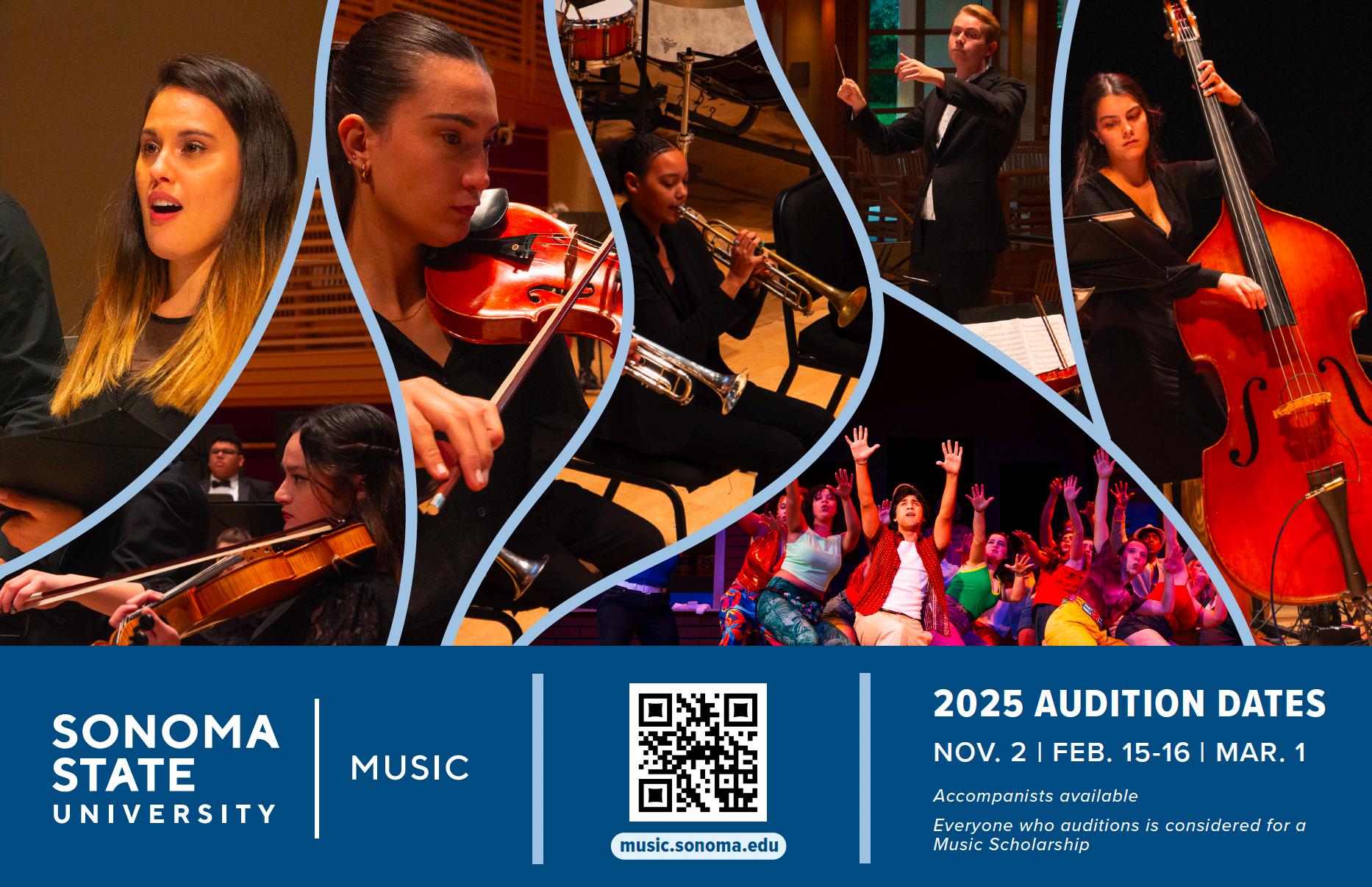
BY ALLAN ROBERT PETKER
Community choirs have always been a part of the ACDA landscape. But things are changing. Its definition varies but a community choir is traditionally a nonprofessional ensemble of singers who practice together and perform choral repertoire Some community choirs are open without audition to anyone who wants to give it a try. Others are auditioned ensembles that perform near the professional level. Ages of ensembles range from children to adult What is changing is the surge in community choirs, at the amateur level to the highest standards of excellence and everything in-between
There are roughly 270,000 choruses in the United States, which include:
Professional and community choruses: About 12,000
K-12 school choruses: At least 41,000
Religious choirs: 216,000
A large portion of ACDA membership are directors in educational settings. Just as there are many choral teachers who also direct religious choirs, there are many that direct community choirs The skills and courses of study are what unites these directors Perhaps it time for ACDA to put more energy into offerings for the community choir director, as well as their singers. Chorus America is an excellent national organization (of which this contributor is a member) that serves the community choir in many ways
ACDA is also a national organization but its structure cascades down into regional, state and smaller community entities. It is this factor that makes ACDA unique and poised to offer distinctive assistance to the community choir More than assistance, it is an opportunity that could broaden its membership
We have enjoyed excellent community choirs at our national and regional conventions. But they are a rare appearance. Church choirs used to be a significant part of ACDA because they were numerous, and many performed at a distinguished level A special “worship” event remains a part of the national convention as well as some regional conferences But the balance is shifting. Community choirs are increasing in numbers and membership while church choir numbers are in decline. This is an additional reason why it may be time to bring the community choir into greater prominence
One possibility is to add the adult community choir to the honor choir rotation at one of these conferences To be in an honor choir is, well, an honor.
Giving community choir singers an opportunity to join others like them to perform together under the direction of a gifted director is a worthwhile experience To sing before an audience of conductors (the esteemed members of ACDA) is also an adventure
The choirs that perform at ACDA events are the best in the world and yet most of their performances, for good reason, are not open to the general public. However, far too many humans have no idea of what an excellent choir sounds like. They have never experienced what we ACDA members enjoy at every conference Adult community choir singers would be thrilled to share in the inspirational experience that is part of attending an ACDA event Launching a new idea is always a challenge We learn what works better every year, and the words of enthusiasm often spread slowly. But it is also exciting to embark on a new adventure.
Some benefits would include:
Introducing a new performance entity into the sequence 1.
2
3
Acknowledging the community choir as an equal partner in the choral arts
Including a group of singers as new potential patrons of ACDA
Some challenges would be:
Fitting in another ensemble into an already busy honor choir schedule 1.
2
Community choir attendees may have time restrictions
Singers would be financially responsible for attending 3
How to select singers and a balanced ensemble 4
5
Developing seminars relevant to community choir directors and singers
Choir members are passionate about the choral art but are unaware of the “celebrities” their directors revere - the composers and conductors that we consider luminaries. Since travel, room and board will be the burden of the singer, the guest conductor will most likely not be the motivation for attendance Therefore, selecting the guest conductor may best be limited to local considerations The conductors who are famous to us (choral directors) are not names our singers necessarily know, but they may recognize the names of composers. Composers who are also conductors may be worthy candidates to serve as a guest conductor.
Belowisanoutlinethatisaworksheetforlaunchingacommunityhonorchoir
Dateandlocation:tobeheldataregionalconvention,FridayandSaturday
Schedule:
Friday-rehearse3-5pm–dinneronown–rehearse7:30-9:30pm.
Saturday – early morning rehearsal prior to the performance slot or perform a shorter program in the conventions closingevent
Singers:
1.Byinvitation:directorselectsquartets,or
2.Singerssubmitanonlineauditiontapetoacommittee,or
3.Setlimitspersectionwithdeadlinedatesandfillfirstcomebasis(ex:30/30/30/30).Reassessbasedonneednearthe deadlinedate
4 Singersmustcomewithmusiclearned
Financed:
1.Travel,room,boardpaidindividually(ACDAhotelratesoffered).
2.Eachsingerbuystheirownmusicorpaidbytheirchorale.
3.Eachsingerpaysa$50registrationfee.
4 Appropriatefeessetforsingerstoattendsomeorallofthegeneralconvention
Conductor:
1.Ofnationalstatureselectedbyacommittee,oroneofthemostrecognizedconductorsinthearea.
3.Travel,lodgingandhonorariumpaidbyACDA.
Repertoire:
1 Guestconductorselectspiecestofitperformancetime,orthecommitteeselectsmusic
Accompanist:
1.Committeeselectsthecollaborativeartist.
2.Travel,lodgingandhonorariumpaidbyACDA.
Logistics:
RehearsalSpaceandpianoprovidedbyACDAatconventionsite
Wewouldlovetoknowyourthoughts.Shouldastrongereffortbemadetoincludecommunitychoirsmoreprominently in ACDA? Is an adult community honor choir at an ACDA regional event the best way to achieve that? Does the outline offered here present reasonable ways to make it work? What edits or new suggestions can you offer? I gladly welcome yourfeedback AllanPetker–apetker@gmailcom

In 1938, Nadia Boulanger conducted the Boston Symphony Orchestra in a performance of Fauré’s Requiem and became the first woman to conduct a major US orchestra. Boulanger is, of course, remembered as “ one of the foremost composition teachers of the 20th century,” and countless composers around the world benefited from her instruction Interestingly, Boulanger shares a birth-year with Florence Beatrice Price, who was born in 1887 in Little Rock, Arkansas Price is known as the first Black woman to have a work performed by an American symphony orchestra, and was prolific with an incredible output that spans and, at times, defies genre.
Besides both being a “first woman to…” Price and Boulanger are modern examples of Thomasin Lamay’s many-headed ones, women whose voices “rise and touch contrapuntally across cultures, across oceans, across intellectual frames of reference that allow both the sameness of “womanhood” and the many differences of culture and ethnicity to be, and to be clearly known ” Across differences of continent, nationality, genre, training, and affiliation, Price and Boulanger nonetheless have in common that they exerted tremendous agency against peers and institutions who were hostile toward them by virtue of their birth.
One standard approach to feminist music history emphasizes the pervasive exclusion of women from mainstream musical activity since the emergence of the Western tradition This understanding is crucial However, a more interesting and informative reading of the same history attends to the particular ways that women have leveraged their constrained standing in service of outstanding creative work: women have gone head-to-head with heads of church and state; have subverted economic domination through coalition and mutuality; have established new genre and innovated form, function, text, and harmony; have ghost-written, written under pseudonym, and written unpublished; have studied and taught in conservatories, studios, universities, and in the streets; have received and
forgone prestigious awards and achievements; have played, sung, danced, plucked, bowed, beat, stomped, shouted, and written.
And, yet, entire concert programs are performed without a single work composed by a woman
What follows is an invitation to veer from the front pages of music distributors and to seek or start new trails toward independent musical exploration. The list of composers welcomes curiosity about works that are not (yet) afforded the same attention as pieces by frequentlyperformed composers on festivals and editor’s lists The living composers listed have more works, and more importantly, email addresses! By studying and performing works by women, we enter into collaborative relationships and broaden our deeply fulfilling musical community
Wan Bulan by Tracy Wong 2-part or SAB Cypress Choral Publishing
The primary theme in Wong’s arrangement of this Malaysian folksong soars out of the opening drone that opens the piece just like the kites that inspire the text With short repetitions of Malaysian text, a contained diatonic tessitura, and exciting shouts written into the score, this piece is both accessible and engaging for students. Wau Bulan invites singers into a bright, overtone-rich vocal production which is exciting and pedagogically significant for developing singers
Wong offers suggestions for movement based on the Dikir Barat style, and also encourages singers to bring their own creativity to the work Body percussion and played percussion support the sustaining energy of this piece.
1Potter, Caroline "Boulanger, (Juliette) Nadia " Grove Music Online 2001
Cusick, “Epilogue:
“Et Misericordia” from Magnificat
by Byung-Hee Oh SSA
Self-published by
composer
A lyrical and warm setting of a familiar text, this excerpt from Oh’s Magnificat develops a graceful and beautifully symmetrical melody that works elegantly throughout the register. A soaring counter-melody in the upper voices creates excitement, comfort, and energy to sustain longer phrases. Finally, rhythmic and textural contrast in the timentibus section drives the work forward and creates interest through text-painting instability and uncertainty
This setting exemplifies Oh’s artful facility in writing singable, lyrical melodies in a lush harmonic language Her style is familiar but interesting, thoughtfully constructed, and compelling for both singers and audience-members.
Heart of Earth
by Shruthi Rajasekar SSA
Oxford University Press
Rajasekar’s compositional fluency and understanding of sound radiates through this exciting work for treble singers and body percussion. A carefree and joyous text is shared by the ensemble through a warm pentatonic melody and nostalgic clapping-game. This piece is exciting to hear, and the careful craft of minimal divisi and clear part divisions make it accessible for a variety of ensemble types
To Propagate a Home
by Ayanna Woods
SATB or SSAA, div
Self-published by composer
Woods’ original text in To Propagate a Home is insightful and urgent, and her setting is insistently rhythmic in a harmonic language that will excite and captivate singers and audiences alike Sections of syncopated homophony are entangled with layers of stacked chords to evoke the roots which this work takes as subject In her artful pairing of interesting rhythmic material with wellcrafted voice-leading and harmony, Woods has tackled the challenge of writing an engaging and attainable work for intermediate to advanced ensembles.
Temporal
arr Diana Saéz and Suzette Ortiz
SATB
La Voz Music Publishing
The plena, a dance form originating in the early 20th century in Puerto Rico, is an important example of the influence of African musical styles on musics from the Caribbean, and Central and South America. Temporal is an invigoratingly rhythmic dance that utilizes call and response and voice parts in pairs contrasted with homophony The composers encourage the use of percussion as an essential expression of style
The text refers to storms in the Caribbean, and the arrangers celebrate the resilience of Puerto Rican people following devastating hurricanes in 2017.
Haddathani Qalbi
Ghada Harb, arr Safana Bakleh
SSA or SATB
Dozen World
Bakleh’s arrangement in the Sufi musical tradition exemplifies this style in the gradual energetic build from a meditative, chant-like melody to a more ecstatic and florid climax evoking dance like the famous Sufi whirling dervishes. The relative ease of the Arabic text is paired with the challenge of a consistently low tessitura, and very long, uninterrupted melodic lines The vital instrumentation in this piece provides a window into the Sufi sound-world and can be adapted for traditional instruments like daf or riq For more information and recordings, see Ghada Harb’s Gardenia Choir
Hold My Hand by Verolga Nix
SATB
Theodore Presser 312-41815
Nix’s straightforward setting of this evocative spiritual provides ample opportunities to develop tone and affect, to address spiritual diction, and to discuss this important musical tradition from the United States This arrangement’s particular treatment of harmony is both accessible for a variety of levels of singers, and satisfying to prepare and perform. Dramatic shaping of dynamics and close attention to diction and articulation provides ample room for exploration in the choir and will make this piece stunning for audiences.
Bajaste del cielo con luz primarosa by
Modesta Bor SATB
Fundación Modesta Bor
Composer, musicologist, and educator Modesta Bor was hugely influential in the development of 20th century Venezuelan musical identity. Her output for unaccompanied chorus (SATB, SSA, and works for children in reduced voicings) includes Venezuelan folk songs, original tonal works on Venezuelan folklore in vernacular styles, and more abstract, Impressionistic works that demonstrate careful attention to counterpoint and a more expansive harmonic language.
Bajaste del cielo con luz primarosa is a meditation on the birth of Jesus set in a diatonic, dance-like style. Bor uses largely-diatonic harmony and rhythmic augmentation to give this piece a familiar warmth and forward motion. Later sections of the piece surround the lyrical melody with onomatopoeia in the outer voices This piece would be an exciting challenge for an advanced high-school or collegiate ensemble
Che desia di saper by Francesca Caccini
Unison
Editions on IMSLP and CPDL
Originally published as part of Caccini’s Il Primo Libro delle Musiche in 1618, this canzonetta demonstrates early17th century secular styles with its rhythmic vivacity, irreverent text, and sectional form Francesca Caccini was an important teacher of the transitional 17th century style, and her other compositions have provided key insight into proto-Baroque ornamentation.
Singing unison repertoire from this period affords flexibility with form, instrumentation, forces, and more to serve your ensemble while building independence, tone, and musicianship The accompaniment can be played on a keyboard like piano, harpsichord, or organ; a harmonic string instrument like guitar; and can be doubled by a bass instrument like cello For more ideas or support, seek recordings like Ars Lyrica Houston’s, and consider Stuart Carter’s A Performer’s Guide to 17th Century Music, published by Indiana University Press.
Dulces al compás by Pamela Mayorga 2-part
Self-published by composer
Mexico City-based composer Pamela Mayorga writes brilliantly for young voices, and Dulces al compás is a perfect representation of her style and technique. Mayorga lists different types of Mexican candies and sweets, set to an accessible and repeated melody with a limited range The options for percussion give even more excitement to a piece which is already guaranteed to energize your elementary singers 2-part harmony appears for the first time in a refrain-type exclamation “Ay, ay ay! muchos dulces al compás!”
To demonstrate her skill and familiarity with young singers, Mayorga concludes this piece as a partner song with earlier melodic material, making this piece accessible for a variety of ensembles or combining ensembles, and a wonderful opportunity to celebrate some Mexican foods!
